|
William R. Huckle, Editor
|

Boston, MA
Postponed until Summer 2021
|
|
Help support our trainee scholarships
Any profits from the sale of these NAVBO items will help fund additional scholarships for students in the Advancing Young Voices Through Diversity and Inclusion Program. Thank you for your support!
Double layered mask
Coffee mug featuring the
NAVBO Online logo
Canvas tote
Fanny pack 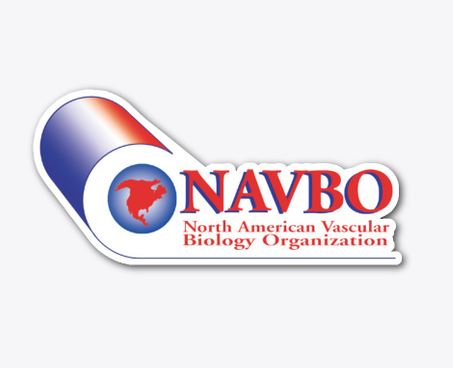 Fun NAVBO sticker!
|
Shop at Amazon?
Help Support NAVBO
|
Vascular Biology Publications Alert Now Available by Subscription
The NAVBO Vascular Biology Publications Alert will now be available to non-members for a $55 a year subscription. If you would like to receive this alert, but are not a member, please contact Danielle at [email protected].
|
|
Partner Network Advantage on the NAVBO Job Board
|
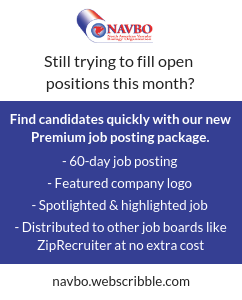
Why post your job on NAVBO's career center rather than going directly to the larger job networks?
Pricing on the mass job boards can vary, but to get a job noticed you typically have to sponsor it for $5 - $10 per day, which can add up quickly especially since you also pay for each click the job gets. When you add it all together, you could be spending up to $45 per day on your job posting. But, when posting a job on NAVBO's career center, you simply pay a flat fee! The Premium package includes our Exclusive Extended Partner Network - which means the jobs are broadcast to sites like ZipRecruiter and Jobs2Careers and more for a flat fee.
With special member pricing, you can post a job for as low as $300 with this Partner Network. You never pay for each click, just the flat fee on the NAVBO career center. In addition, the Premium package includes a 60-day job posting making it a great value. The Premium packages also offer features like having your company's logo featured on the career center homepage, having your job appear first in search results, and more.
|
Your data privacy and security are important to NAVBO. To that end, we have updated our privacy policy to reflect recent privacy and security regulation implementations and changes. Please review our policy as time permits so you have a complete understanding of the data we have, why we have it, and how we use it.
Part of the updates relate directly to the European Union's new General Data Protection Regulation (GDPR) that went into place May 25,2018. The GDPR seeks to improve the transparency of data usage and give end users more control over their own data. We believe these changes are important and will be compliant with the GDPR regulations.
Contact NAVBO if you have any questions or to change your communication preferences.
Please note, you can unsubscribe to this newsletter at anytime by clicking on the SafeUnsubscribe in the footer.
|
|
 |
|
Vascular Biology 2020 - It's Not Over Yet!
|
|
You can still register and gain access to the recordings!
There are 77 presentations (45 by invited speakers and 32 short talks from selected abstract presenters). Plus - you'll also gain access to almost 200 ePosters and the recordings of several professional development related round tables.
If you spoke to colleagues that attended, then you've heard it was a great meeting - you don't have to miss it entirely!
Register soon - the recordings will only be available through November 28!
(In fairness to those who registered and attended the meeting, the same registration fees remain in effect - $175 for regular members; $125 for trainee members and $325 for non-members) |

Our next webinar, November 12, 2020 at 1:00pm EST, will feature Dr. Hellmut Augustin, of the Heidelberg University and German Cancer Research Center, and his presentation on Vascular Control of Tumor Progression and Metastasis.
|
The Lab of Dr. Teresa Sanchez
|
Teresa Sanchez
My name is Teresa Sanchez and I am an Assistant Professor of Pathology and Laboratory Medicine, with a secondary appointment at the Feil Family Brain and Mind Research Institute at Weill Cornell Medicine. I obtained my first independent position and established my laboratory initially at Beth Israel Deaconess Medical Center, Harvard Medical School. Subsequently, for family reasons, I had to relocate to New York City, and I moved my laboratory to Weill Cornell Medicine. I am very privileged to have had the opportunity to establish my research program in two outstanding institutions and I am happy to share my experience transitioning from trainee to faculty, setting up my lab and moving my research program from Harvard Medical School to Weill Cornell Medicine.
1. Transitioning from trainee to independent investigator. Establishing and leading a laboratory requires a complex set of skills, which go beyond the ability to conduct rigorous science. As junior faculty, we continue heavily involved in data generation and analysis as well as manuscript preparation. In addition, we take on further responsibilities, such as securing extramural funding, managing and leading the laboratory, as well as teaching, and mentoring. During my PhD and Postdoctoral training, I had the opportunity to acquire a solid background in science and strong technical expertise, even lab management experience. While these skills are very important, I soon realized that they were not sufficient to successfully establish my research program and direct the laboratory. Other personal skills, such as having good strategies for efficient time management, effective communication, negotiation, conflict resolution, as well as learning to build resilience and to face and overcome obstacles, are equally important. In particular, I found that learning to efficiently manage and protect my time was pivotal in order to dedicate enough time to write and obtain grants to be able to develop my independent lines of investigation and effectively lead the team.
My advice to new principal investigators would be to, early on, dedicate time to reflect on the importance of these aspects of your personality and how they affect your work. Becoming aware of your own strengths and weaknesses is the first step to work towards improvement. I found that being able to reach out to colleagues and senior mentors to seek advice as well as participating in leadership courses in my institutions was very helpful to identify and strengthen some of my personal areas for improvement.
2. Building a team. When building the research team, I found it is very important to recruit scientists with distinct and complementary expertise and from different countries and ethnic backgrounds. As team leader, a top priority should be to foster a culture of rigor, integrity, transparency, collaboration, equity, diversity, inclusivity and a sense of community in the laboratory. In my opinion, that is the ideal environment for professional and personal growth of the individuals and the team as a whole. Useful strategies to establish these values in the laboratory are to lead by example and to emphasize early on (e.g. at the moment of the interview of the candidates) what is the mission of our laboratory, how this mission is aligned with the goals of the individual members and how critical this culture is to achieve our mission.
Having laboratory group meetings and individual meetings regularly is very important for the progression and timely completion of the projects and to assure good communication. In the laboratory meetings, it is important to encourage critical thinking, transparency and constructive criticism, always in a relaxed and friendly atmosphere. Overall, I find very important to focus on the positive aspects of our work to motivate the team and help promote resilience and perseverance.
When conflicts arise, the principal investigator, as an objective and neutral observer, plays a critical role in resolving the issues and building consensus. I found helpful to talk first, individually with the persons involved and then, discuss the issue openly altogether and agree on future actions.
In summary, my advice is to spare no effort to foster creativity, innovation, scientific rigor, interdisciplinary research, perseverance, resilience, a sense of community and a culture of diversity and inclusion in the lab. I have learned that these are good strategies to build a strong, motivated and productive team.
3. Balancing personal life and work. I found this aspect particularly challenging as my family was growing and I continued taking on new responsibilities at work. For instance, on a personal note, relocating my family to New York City and moving the laboratory to Weill Cornell Medicine shortly after the birth of our second child and in the midst of my first R01 renewal was especially demanding. More recently, due to the COVID19 pandemic, we have all faced and are currently facing unprecedented challenges in our professional and personal lives. While the pandemic has affected all of us in many different ways, the negative impact on the career growth of junior scientists with young children is becoming very evident. The current limited options for childcare and education are hindering junior faculty and it is disproportionally affecting female trainees and faculty, accentuating gender disparities in academic growth.
My advice to young faculty with young children scrambling to maintain their productivity during this pandemic (or other unexpected circumstances in the future) would be to encourage them to keep their perspective and not to be intimidated by the faster career progress of other scientists who many not have children. In addition, it is important for faculty to petition academic institutions to find ways to help the career growth of junior faculty with young children during this pandemic. We can make very unique and important contributions to science by mentoring and helping the next generation of young female professionals in biomedical research, which is critical to maintain a diverse and vibrant scientific community. If no action is taken, we are at high risk of losing the progress made in the last few decades to increase equity and diversity in academia.
Overall, at times during my career, it has been challenging to reconcile my professional and family responsibilities. However, I firmly believe that being a mother has given me greater perspective and has helped me to be a better scientist, mentor and team leader. My message to other female faculty establishing their labs is to keep the perspective and focus on the positive impact that raising children have on our ability to make unique and significant contributions to science.
4. Moving the laboratory. Sooner or later in our careers you will likely consider moving the lab due to professional or personal reasons. When considering other offers, look for opportunities to expand your research program and your network of collaborators. Also, make sure that there is institutional commitment and that resources to grow your career are at your disposal. When negotiating with your current and future institutions, it is important to be flexible but also to remember that you are your best advocate. Having gone through this process once, I have learned that it is critical to plan to give yourself enough time to move in order to finish pending projects and submit pending grants. If possible, negotiate with both institutions having a co-appointment to facilitate the transition.
5. Concluding remarks. I hope that sharing some of the lessons that I learned establishing my laboratory is helpful to other scientists. I always found it very enriching to learn from other people's experience and I appreciated the honest advice that I received from my colleagues and senior mentors. However, I personally find that it is also very important to be creative and genuine when crafting our careers and not to feel intimidated if our career path has not been conventional according to pre-set standards. As the Spanish poet, Antonio Machado wrote in 1912: "Caminante no hay camino, se hace camino al andar. Caminante, son tus huellas el camino y nada más"; "Traveler, there is no path, the path is made by walking.
Traveler, your footprints create the path, your footprints and nothing else".
|
|
NAVBO Members Get Member Rates!
|
Round Table at VB2020 Mulls Training Challenges in the COVID-19 Era
A panel discussion at last week's VB2020, featuring training program leaders Brian Black (UCSF), Kishore Wary (UI-Chicago) and Michael Chin (Tufts), as well as PhD student Katrina Colucci-Chang (Virginia Tech), examined a variety of impacts the coronavirus pandemic has had on the training experience in cardiovascular biology. The conversation, moderated by Bill Huckle from Virginia Tech, covered such topics as institutional and personal resilience, interruptions to funding and progress to degree, and the unexpected positives that have emerged as we have learned to cope with our challenging circumstances. Attendees and panelists agreed that, although extramural sponsors have shown extraordinary flexibility for deadlines, progress reports, and more, the times are proving uniquely stressful, emphasizing the importance of attention to mental health needs. The effects of social isolation, particularly among international students, also were of concern. The session ended on an upbeat note, however, as trainees and mentors alike shared appreciation for their colleagues' gestures of humanity, willingness to adapt cheerfully, and focus on our common goals. Quoting from the Zoom chat: "The pandemic is teaching us to be smarter, more organized, focused scientists" and "as a trainee I have learned to multi-task, organizing my agenda and meeting my deadlines! Silver lining!!"
If you'd like to watch the video of this round table discussion, follow this link:
|
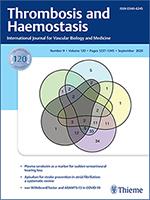
Thrombosis and Haemostasis
Thrombosis and Haemostasis provides a forum for the exchange of ideas and concepts fostering cross-disciplinary insights in basic and clinical research. The journal is published monthly in print and online via Thieme E-Journals.
It is covered in the main abstracting and indexing services and has an impact factor of 4.379.
|
Harvard Medical School Seminars in Vascular Biology
Organized by several NAVBO members (Peter Libby, Michael Gimbrone, Masanori Aikawa, Guillermo Garcia-Cardena, and Patricia D'Amore), this seminar series offers weekly talks on Thursdays at 4:30 PM (ET). Here's what's coming up this month:
November 5
Christer Betsholtz
Uppsala University
"Endothelial-pericyte Signaling in Microvascular Physiology and Disease"
November 12
Michael Klompas, MD, MPH
Harvard Medical School
"COVID-19"
November 19
Robert Padera, MD, PhD
Harvard Medical School
"Autopsy Pathology of COVID-19: A First-Person Perspective"
|
Welcome to our New Members:
Sabu Abraham, University of Manchester
Neha Ahuja, UT Southwestern
Yasaman Aghazadeh, University Health Network
Cassondra Axen, University of Illinois at Chicago
Dakota Becker-Greene, Brigham and Women's Hospital, Harvard Medical School
Mathilde Bizou, CHUSJ
Yujun Cai, Yale University School of Medicine
Manuel Cantu Gutierrez, Baylor College of Medicine
Nan Chiang, Brigham and Women's Hospital
Aleksandra Cwiek, University of Virginia
Skyla Duncan, Columbia University Medical Center
Raony Ferreira Franca, Brigham and Women's Hospital
Carlos Perfecto Flores-Suarez, Baylor College of Medicine
Margarida Florindo, University Lusofona
Eunate Gallardo, Yale University
Jenny Ge, Brigham and Women's Hospital, Harvard Medical School
Astrid Gillich, Stanford University School of Medicine
Maria Concepcion Izquierdo, Columbia University
Cynthia Kankeu, University of Virginia
Aziz Khan, University of Illinois at Chicago
Jorden Lane, University of Chicago
Jason Lee, Western University
Arthur Liesz, LMU Munich
Ruofei Liu, Peter MacCallum Cancer Centre/University of Melbourne
Antoine Louveau, Cleveland Clinic
Irina Lupu, University of Oxford
Ross Metzger, Stanford University
Shin Mukai, Brigham and Women's Hospital
Amitabha Mukhopadhyay, University of Illinois at Chicago
Lori OBrien, UNC Chapel Hill
Lawrence Pinkus, National Institutes of Health
Rachel Roth Flath, Pfizer, Inc.
Henrique Silva, Universidade Lusófona
Daria Skwarzynska, University of Virginia
Abhijeet Sonawane, Brigham and Womens Hospital Harvard Medical Shool
Candace Strang, IPPIN Biomarkers
Maria Giovanna Trivieri, Mount Sinai
Meral Tubi, USC
Lucas Umesaki Itto, Brigham and Womens hospital, Harvard Medical School
Paula Viza Gomes, University of Chicago
Koral Wheeler, University of Southern California
Yu Zhu, Stanford University
|
 |
| Recent Publications by NAVBO Members |
Hydrogel Network Dynamics Regulate Vascular Morphogenesis
Cell Stem Cell
Matrix dynamics influence how individual cells develop into complex multicellular tissues. Here, we develop hydrogels with identical polymer components but different crosslinking capacities to enable the investigation of mechanisms underlying vascular morphogenesis. Read more
Targeting Heme Oxygenase-1 in the Arterial Response to Injury and Disease
Antioxidants
Heme oxygenase-1 (HO-1) catalyzes the degradation of heme into carbon monoxide (CO), iron, and biliverdin, which is rapidly metabolized to bilirubin. The activation of vascular smooth muscle cells (SMCs) plays a critical role in mediating the aberrant arterial response to injury and a number of vascular diseases. Read more
|
Whither science in the election's aftermath?
As the US (and much of the world) watches the slow unfolding of the post-election process, we have extra time to ponder the ramifications of a Biden or Trump victory on the prospects of federal support for basic and applied research. Elizabeth Redden, writing in Inside Higher Ed, notes that this has been far from a typical election year, when the candidates' differences typically have not strayed beyond subtleties of their respective priorities for NIH or NSF funding. Moreover, Redden notes soberly that a more fundamental issue was effectively on the ballot in this election: the respect for science expected to be shown by key decision-makers in government. The incumbent has continually downplayed the risks of the pandemic and the need for public health measures. Candidate Biden has shown more willingness to take seriously the threats posed by the coronavirus as well as climate change and other environmental challenges. Regardless of the outcome of the election, it will likely take years to restore science to a proudly featured, and publicly admired, role in our President's portfolio.
|
|
Frontiers in Cardiovascular Medicine
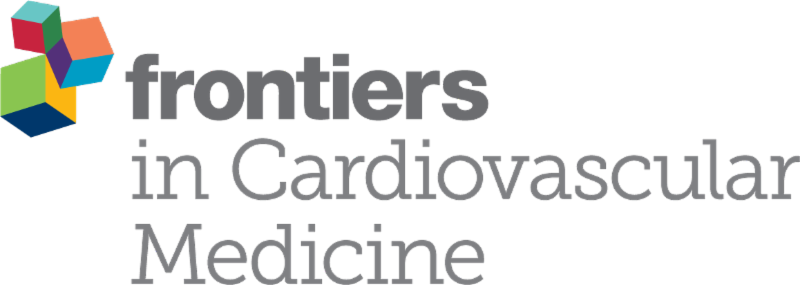 Special Research Topics Special Research Topics
What do we know about COVID-19 implications for cardiovascular disease?
The coronavirus epidemic causes major cardiovascular complications. Underlying mechanisms, however, remain incompletely understood. Frontiers in Cardiovascular Medicine invite you to submit your article on this topic. We consider all types of manuscripts: fundamental basic science reports, translational or clinical studies, review articles and methodology papers.
We have already published 17 articles. More submissions are currently under review. Due to the popularity and the emerging nature of this topic, we decided to extend the deadline to December 31, 2020. All articles submitted before this deadline will be published free of charge. We encourage you to take advantage of this opportunity to publish your original study or review article in FCVM (Impact Factor 3.915).
|
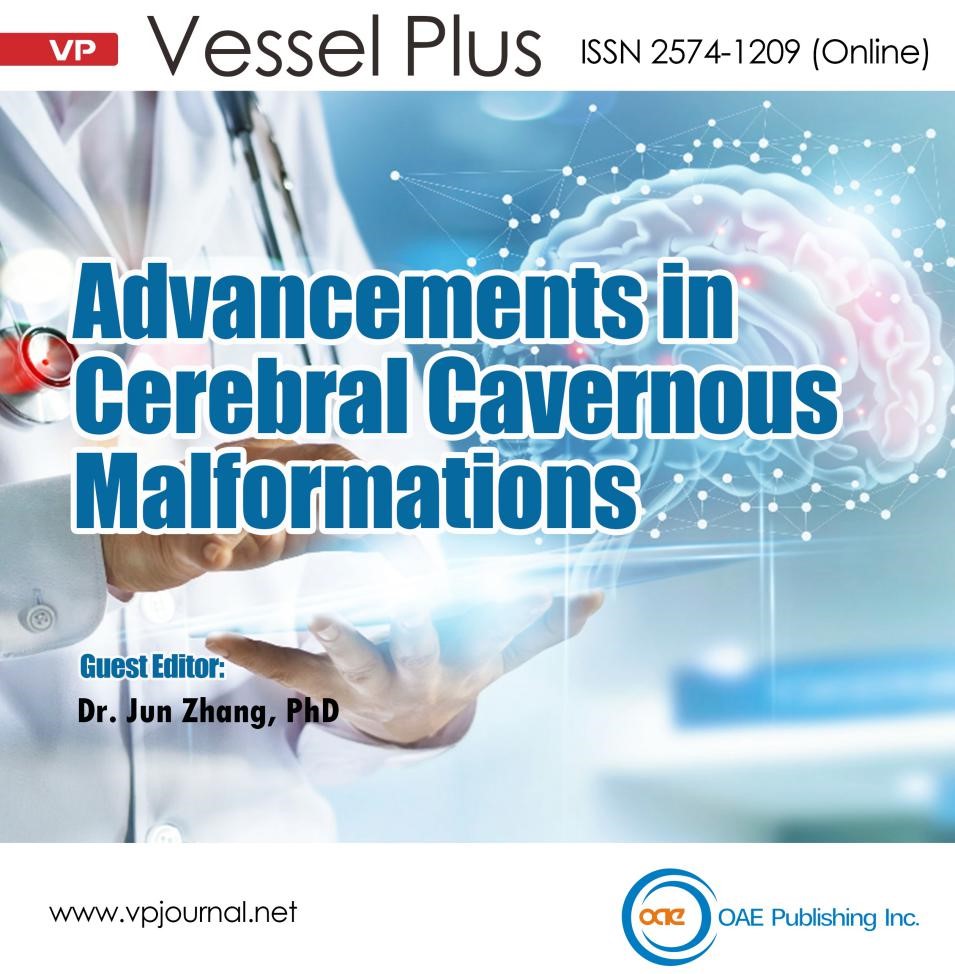
Dear friends and colleagues,
Jun Zhang, PhD (Associate Professor, Texas Tech University Health Sciences Center El Paso), is organizing a special issue entitled "Advancements in Cerebral Cavernous Malformations" in journal Vessel Plus (VP, ISSN 2574-1209).
This special issue aims to bring readers the up-to-date view of advancements in the scientific and technology innovations, translational and basic-science studies, and clinical trials of cerebral cavernous malformations. For more details about this special issue and the "Author Instructions", please visit the website at https://vpjournal.net/journal/special_detail/459.
Are you interested in contributing an article before February 15, 2021? If yes, please contact Jun Zhang ([email protected]), the Guest Editor for this special issue, or Mavis Wei ([email protected]), the Managing Editor of VP. If you need additional information, please feel free to contact us.
VP is an online open access journal which was launched on March 31, 2017 by OAE Publishing Inc. It waives the Article Processing Charge (APC) for all publications since launched. Thus, your manuscripts will be published totally free of charge once officially accepted after quick and rigorous peer-review. Meanwhile, all manuscripts published in VP will be immediately available online for free downloading and reading. Further, if the work is funded by NIH, we can deposit it in PubMed on your behalf.
Thank you for considering this invitation.
|
Dear friends and colleagues,
This special issue aims to provide readers with an up-to-date advancement in lesser-known genes, proteins and signaling pathways in vascular biology. Manuscripts related to concepts from these genes and proteins and their associated signaling pathways that connect into the well-established vascular ligand-receptor signaling systems are welcome. For more details about this special issue and the "Author Instructions", please visit the website at https://vpjournal.net/journal/special_detail/478. Are you interested in contributing an article before December 31, 2020? If yes, please contact Ramani Ramchandran ([email protected]), the Guest Editor for this special issue, or Mavis Wei ([email protected]), the Managing Editor of VP. If you need additional information, please feel free to contact us. VP is an online open access journal which was launched on March 31, 2017 by OAE Publishing Inc. It waives the Article Processing Charge (APC) for all publications since launched. Thus, your manuscripts will be published totally free of charge once officially accepted after quick and rigorous peer-review. Meanwhile, all manuscripts published in VP will be immediately available online for free downloading and reading. Further, if the work is funded by NIH, we can deposit it in PubMed on your behalf. Thank you for considering this invitation.
|
|
|